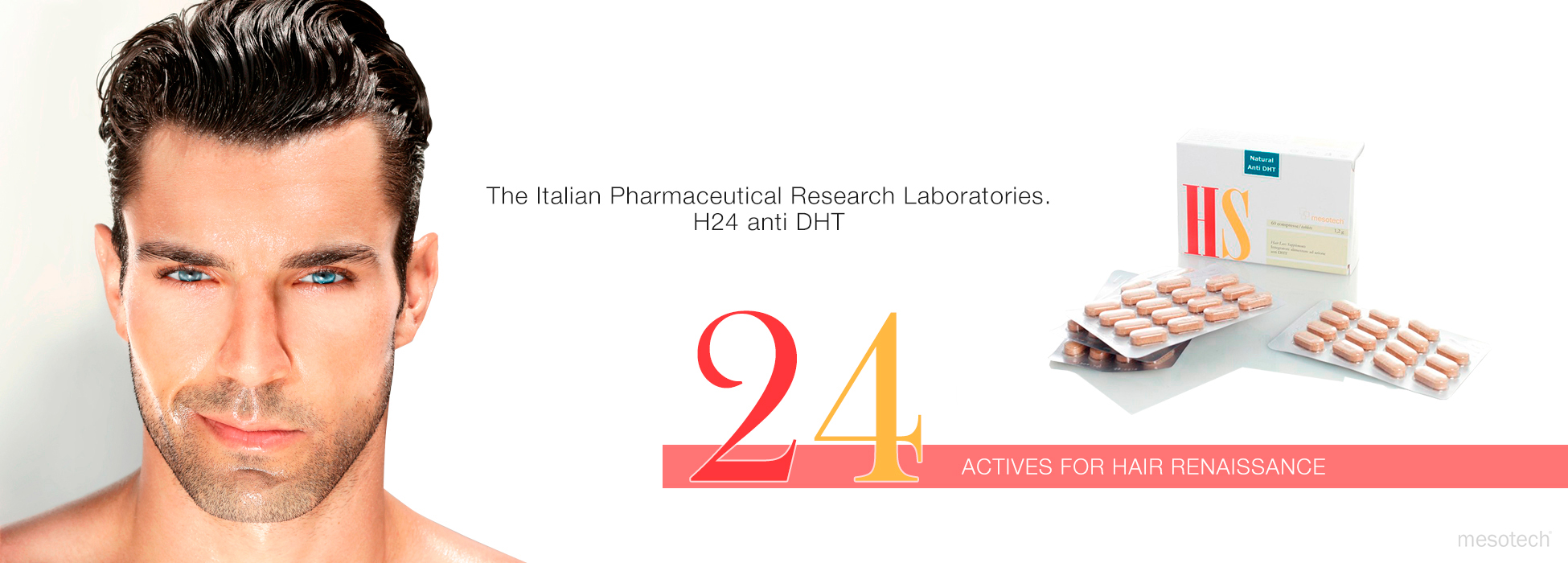This treatment helps
- Hereditary hair loss (androgenetic alopecia).
- Diffuse hair loss due to stress, nutritional imbalance or hormonal changes.
- Supporting normal hair quality and pigmentation.
ANTI‑DHT
Nourishing supplement for professional use in clinic and home care.
Contains Serenoa repens (saw palmetto), Urtica dioica (nettle), Panax quinquefolius (American ginseng), Ginkgo biloba, taurine, B‑vitamins and minerals.
Serenoa repens, Urtica dioica, Panax quinquefolius, Ginkgo biloba, taurine, biotin, niacin (B3), vitamin B6, folate, iodine, copper and plant sterols.
HS Hair Supplement is an advanced dietary supplement developed with carefully selected natural extracts: saw palmetto, nettle, American ginseng, ginkgo biloba, taurine, B‑vitamins and essential minerals. The balanced composition is designed to support hair health, maintain natural pigmentation and contribute to core physiological functions.
Microcrystalline cellulose, gelatin, dibasic calcium phosphate, Pinus sylvestris (pine) bark dry extract standardized to 95% proanthocyanidins, astaxanthin (from Haematococcus pluvialis). Anti‑caking agents: vegetable magnesium stearate, colloidal silicon dioxide.
2 tablets daily, preferably during or immediately after a meal. Do not exceed the recommended daily dose.
This supplement is not a substitute for a varied diet and healthy lifestyle. Keep out of reach of children under 3 years. Not to be used by women of childbearing age and by persons before puberty.
Store in a cool, dry place. Shelf life presupposes correct storage in unopened containers.
Supports the normal hair growth cycle. Biotin and selected minerals help maintain normal hair; vitamin B6 supports energy metabolism.
Results vary. With regular use as part of a healthy lifestyle, visibility may improve gradually over time.
Primarily natural ingredients. Check for allergens and seek advice if in doubt.
See our concept for hair loss and hair growth stimulation here


HS is ideal for clients who:
Reduced shedding: Addresses hormone‑related and hereditary hair loss by supporting a balanced environment for follicles.
Prolonged growth phase (ANAGEN): Encourages follicles to remain longer in the growth phase, resulting in denser, healthier hair.
Stronger follicles: Helps protect follicles from hormonal and inflammatory stressors that may lead to permanent loss.
Below you’ll find frequently asked questions about hair loss.
Some daily hair shedding is normal. Persistent thinning without regrowth is considered hair loss. Main types include:
Hereditary hair loss (androgenetic alopecia) – genetically driven and often increases with age; DHT stresses follicles leading to miniaturization.
Circular hair loss (alopecia areata) – autoimmune, with round patches; follicles are typically intact and non‑scarring.
Diffuse hair loss (alopecia diffusa) – generalized thinning; seen e.g. with thyroid disease, medication changes, iron deficiency or prolonged stress.
Over 50% of men and ~20% of women experience hair loss during life. Causes are individual and often multifactorial: hormones (DHT), nutrition, iron/B‑vitamins and psychological stress.
In established baldness without active follicles, no effect should be expected. Hair transplantation may be the only option.
DHT (dihydrotestosterone) is formed from testosterone via 5‑α‑reductase and is linked to androgenetic hair loss. Serenoa repens is often discussed in that context.
Combine an Anti‑DHT approach (saw palmetto), vitamin/amino support and anti‑stress approach (ginseng, B6) as a basis for normal hair growth.
Recommended B2C prices for HOME CARE products (EUR; conversion fixed at DKK 7.45 = €1):

HS Hair Supplement
4 × packs of 60 tablets (4 months)
Recommended B2C price: €109.06 (incl. VAT)

Tricocure hair serum
4 × bottles of 25 ml (4 months)
Recommended B2C price: €194.63 (incl. VAT)

Tricocure shampoo against hair loss
2 × air‑tight bottles of 150 ml (4 months)
Recommended B2C price: €52.35 (incl. VAT)



Visual documentation and treatment results – below you’ll find one extra image and two summary cards on results and overall effect.

First subtle changes may appear from ~14 days. Clearer results are expected after at least 2 months, while optimal improvement is typically seen from ~4 months. Tricocure is recommended in cycles of up to 4 months at a time.
The combination of an Anti‑DHT approach, improved microcirculation (serum), vitamin/amino support and gentle scalp care (shampoo) provides a strong foundation for maintaining normal hair, hair quality and color.

| Ingredients | 461 |
| Treatment Areas and Results | 462 |
| How to use | 463 |
This combination of ingredients works synergistically to combat hair loss, stimulate hair growth, and improve the health of both hair and scalp. Many ingredients, such as Serenoa repens and beta-sitosterol, target hormonal hair loss, while others, like biotin and folic acid, nourish and strengthen the hair from root to tip.
Hair System HS is a targeted solution for individuals suffering from hormonal or genetic hair loss, aiming to improve hair quality and stimulate the growth of healthier hair. The product works through a combination of antiandrogenic and Anti-DHT properties to deliver lasting results.
Dosage:
Diet and Lifestyle:
Storage:
Special Recommendations:
These instructions ensure the proper use and storage of the product to achieve optimal results.
| Title | Type | Size | Download |
|---|---|---|---|
| Label-HS-Tablet-DK.pdf | 96.62KB | Download |
Customers who bought this product also bought
DTG138-2.5
test(Click on photo for more info)
In stock